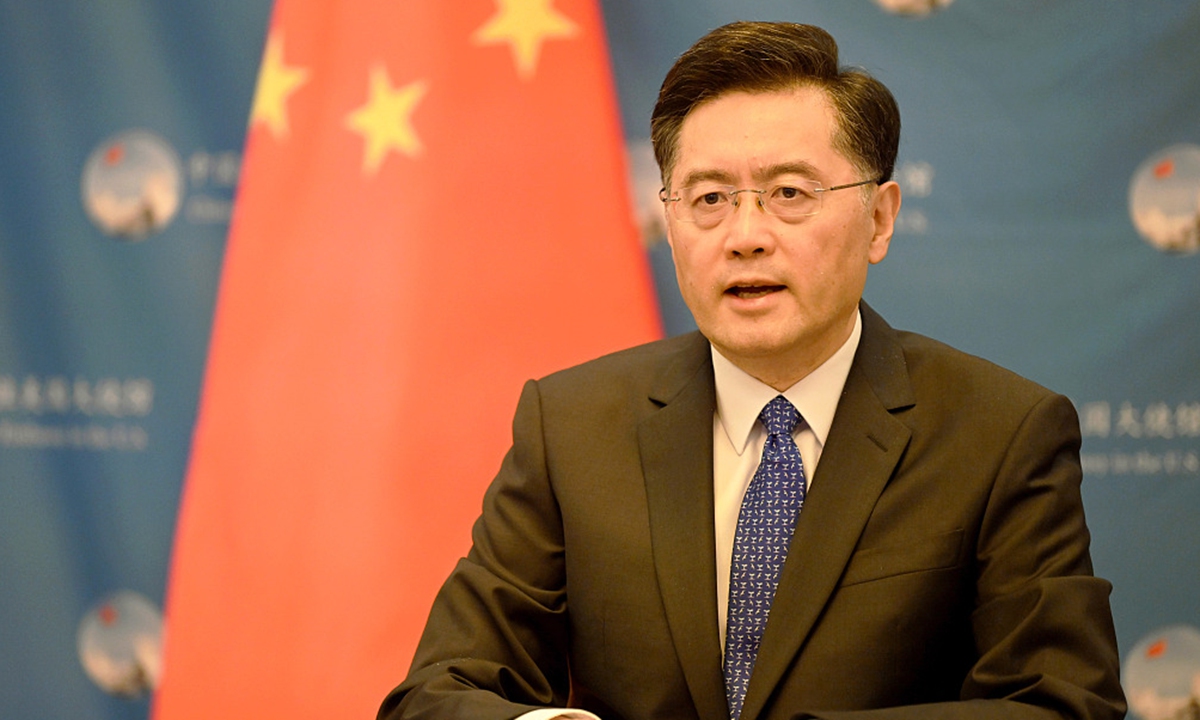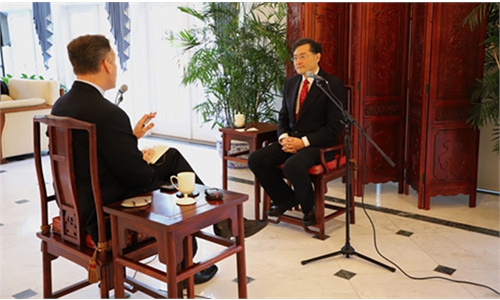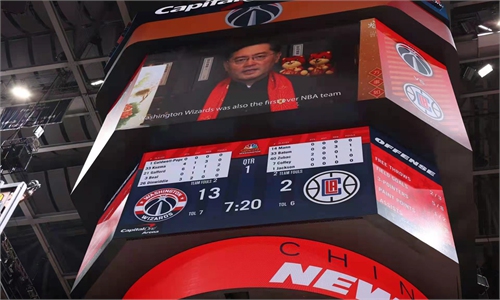Chinese envoy debunks Ukraine crisis rumors
Consistent with stance, showcases neutral, responsible attitude

Chinese Ambassador to the US Qin Gang Photo:VCG
Two days after China's top diplomat Yang Jiechi met with US national security advisor Jake Sullivan in Rome, Chinese Ambassador to the US Qin Gang reiterated China's stance on the Ukraine crisis and hit back at recent rumors and disinformation spread by some US politicians, whose conducts have showed the country's true face of "an empire of lies" by passing the buck to China, despite knowing that the cause of the crisis is the NATO's eastward expansion.
In an opinion piece by Qin published in The Washington Post on Wednesday, the ambassador refuted recent media reports that claim "China had prior knowledge of Russia's military action," demanded that "Russia delay it until the Winter Olympics ends," and Russia was "seeking military assistance from China."
"Let me say this responsibly: Assertions that China knew about, acquiesced to or tacitly supported this war are pure disinformation. All these claims serve only the purpose of shifting blame to and slinging mud at China," Qin wrote in the article.
There were more than 6,000 Chinese citizens in Ukraine. China is the biggest trading partner of both Russia and Ukraine, and the largest importer of crude oil and natural gas in the world. Conflict between Russia and Ukraine does no good for China. Had China known about the imminent crisis, we would have tried our best to prevent it, Qin said.
The Chinese envoy stressed that China is committed to an independent foreign policy of peace and the country's position on Ukraine is objective and impartial. Given this, threats against Chinese entities and businesses, as uttered by some US officials, are unacceptable. Neither war nor sanctions can deliver peace. Wielding the baton of sanctions at Chinese companies while seeking China's support and cooperation simply won't work, Qin said.
Qin's wording "Had China known about the imminent crisis, we would have tried our best to prevent it" has attracted wide attention with some people asking whether the statement was consistent with China's previous stance on China-Russia ties.
At Wednesday's routine press conference, Chinese Foreign Ministry Spokesperson Zhao Lijian said "Ambassador Qin Gang made China's position clear enough in his article. As a sovereign country, Russia has the right to make its own decisions. There is no necessary connection between this and China-Russia relations."
Chinese analysts said the ambassador's article is a strong response to the recent rumors and the statement that "we would have tried our best to prevent it" is consistent with China's previous statements on many occasions, and demonstrates a neutral and responsible position as a major responsible country in a clearer way.
"China has always opposed the use of war and violence to resolve conflicts and this consistent position is the same for any country. In this regard, China would definitely dissuade the conflict if it was informed," Cui Heng, an assistant research fellow from the Center for Russian Studies of East China Normal University, told the Global Times on Wednesday.
Cui pointed out that the reason why the US-led Western media sensationalized these rumors is to drag China into the field of public opinion in the conflict," said Cui, noting that the conflict itself has nothing to do with China, as their purpose is to stigmatize China and sow discord and even damage China-Russia relations.
According to Cui, the operation was made by a small group of decision-makers and it is unlikely for China to know ahead. These rumors are against the basic foundation for China-Russia ties that "does not target the third party."
In Ukraine, China has made huge efforts to push for peace talks and the prevention of a humanitarian crisis and has made its position on several occasions.
In a phone call with President Vladimir Putin on the second day of the conflict, President Xi Jinping expressed China's desire to see Russia and Ukraine solve the issue through negotiation as early as possible and received a positive response. When meeting virtually with leaders of France and Germany, Xi emphasized the need to jointly support peace talks between Russia and Ukraine.
Yang Jiechi, a member of the Political Bureau of the CPC Central Committee and director of the Office of the Foreign Affairs Commission of the CPC Central Committee, just met with US national security adviser Jake Sullivan in Rome. During the meeting, Yang said that "the Chinese side does not want to see that the situation in Ukraine has come to this point."
State Councilor Wang Yi also maintained close communication with Secretary of State Antony Blinken and other foreign ministers, exchanging views on the Ukraine crisis.
China has also outlined a six-point initiative to prevent a humanitarian crisis in Ukraine.
Spokesperson of the Chinese Mission to the EU also said in a statement on March 5 that "the evolution of the Ukraine issue is something China does not want to see. The Ukraine issue is complicated. China always decides its position and policy according to the merits of the matter itself."
"Clearly, the West did not hear China's voice carefully. They only 'interpret' China's position according to their own needs and inherent prejudices," said Cui.
Zheng Yongnian, a professor of political science at the Chinese University of Hong Kong (Shenzhen), told the Global Times that in the Russia-Ukraine conflict, the most important thing for China is neither to allow the West to define China and Russia ties with their own narrative, nor to sit back and watch the US "kidnap" Europe.
While security concerns had partly trumped economic considerations for Europe in the short term following the outbreak of the conflicts between Russia and Ukraine, Europe was still something that China could reach out to, Zheng said, noting that the video summit between President Xi and the leaders of France and Germany is a meaningful move.
As long as Russia feels its national security is threatened, and as long as NATO exists, Putin would seek to build a security mechanism. While we don't want this conflict to happen, the dynamics behind Russia's move are realistic, Zheng said.




